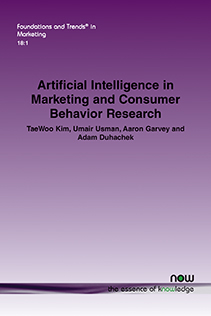Artificial Intelligence in Marketing and Consumer Behavior Research
By TaeWoo Kim, University of Technology Sydney, Australia, TaeWoo.Kim@uts.edu.au | Umair Usman, Florida International University, USA, Umair.Usman@uky.edu | Aaron Garvey, University of Kentucky, USA, amgarv@gmail.com | Adam Duhachek, University of Illinois Chicago, USA, adamd@uic.edu
Abstract
Examining the impact of technology on marketing has been an important research topic dating to the advent of radio, TV, and the Internet. Whereas each new technology had its own implications in the history of marketing research, it is becoming increasingly clear that the emergence of artificial intelligence (AI) is changing the marketing landscape in an unprecedented way. AI technology has been long out there, but recent breakthrough developments suggest we are entering a new technological zeitgeist with profound implications for both marketers and consumers. The current research provides a systematic review of academic AI research conducted in the domain of marketing and consumer psychology. The current review integrates previous research published in leading marketing and psychology journals between 2018 and 2023, during which behavioral research on AI has grown substantially. We synthesize the existing literature and provide guidance for behavioral researchers working in this area. This review concludes with a discussion on critical issues associated with AI and makes suggestions for future research directions.
Artificial Intelligence in Marketing and Consumer Behavior Research
In the past decade of marketing scholarship, researchers have begun to examine the promise of AI technology to address practical problems through a consumer lens. Artificial Intelligence in Marketing and Consumer Behavior Research reviews the state of the art of behavioral consumer research involving AI-human interactions and divides the literature into two primary areas based on whether the reported effects are instantiations of consumers displaying a positive or negative response to encounters with AI. This monograph aims to contribute to the literature by integrating the growing body of AI research in marketing and consumer psychology. In doing so, the authors focus on the burgeoning yet less examined behavioral studies conducted in marketing and consumer behavior. They also identify the theories and process mechanisms that explain the reported effects.
Artificial Intelligence in Marketing and Consumer Behavior Research proceeds as follows. Section 1 examines the history of AI research in marketing. Section 2 reviews and categorizes the decision contexts explored to date in this literature, while identifying the key theoretical constructs explored in these contexts. Section 3 provides an overview of moderators that have been demonstrated to alter the effects of AI-related consumption. Section 4 examines psychological processes that underlie consumer responses to and decisions involving AI. Section 5 provides the stimuli and manipulations employed in this research to date, while also suggesting a taxonomy of AI agents to guide future research designs. Section 6 offers future research directions for behavioral AI research in marketing.
